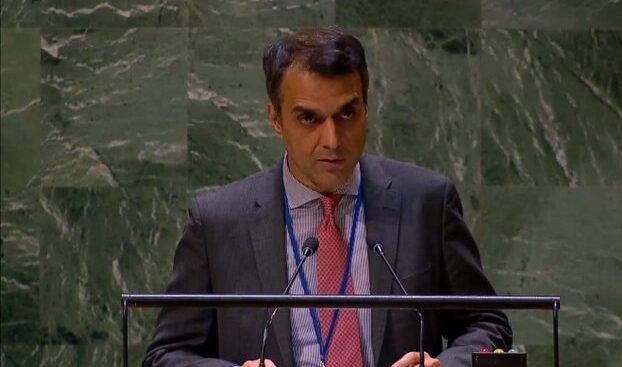WNAM REPORT: Pakistan has underscored the importance of stepping up progress towards sustainable energy goals at an event arranged by China and partners that focused on hastening the adoption of clean energy.
In his remarks at the session on, Global Energy Interconnectivity and Transition for SDGs (Sustainable Development Goals), Ambassador Usman Jadoon, deputy permanent representative of Pakistan to the UN, pointed out that investments in sustainable infrastructure were not commensurate with the scale of the challenge the international community faces.
“The need for energy transition was also recognized in COP-28 (the UN climate conference in UAE) in which we agreed to pursue a “Just Energy Transition,” he said.
Noting a $2.5 trillion annual funding gap in infrastructure, with two-thirds needed in developing countries, the Pakistani envoy said that clean energy financing needs were estimated at $ 4.3 trillion per year until 2030, increasing to USD 5 trillion per year until 2050.
“Yet”, he said, “international public financial flows to developing countries in support of clean energy have been decreasing since 2020.”
In 2022, Ambassador Jadoon said that investment in renewable energy reached only $ 0.5 trillion, mainly in developed countries or major emerging economies,
On their part, the Pakistani envoy said most developing countries have set ambitious energy transition targets in their nationally determined contributions (NDCs). In this regard, he said Pakistan aims to achieve 60% renewable energy by 2030, with the energy transition estimated to cost over $100 billion by 2030 and an additional $ 65 billion by 2040.
He said that developing countries struggle to mobilize sufficient investment for their NDC targets due to limited public resources and challenges in securing private investment.
Ambassador Jadoon said the energy transition would require mobilizing significantly larger quantities of concessional finance to mitigate country and project risks, enhancing credit quality, and improving financing terms; as well as concrete and innovative mechanisms to aid developing countries in developing a pipeline of viable infrastructure projects.
China , he aid, has been a key partner for developing countries in achieving SDG-7, highlighting that under the China-Pakistan Economic Corridor, several energy projects have been undertaken, including the Karot Hydropower Project, Quaid-e-Azam Solar Park, and various Wind Power Projects.
The Global Energy Interconnection project, proposed by the Global Energy Interconnection Development and Cooperation Organization, represents an innovative initiative that will significantly contribute to achieving SDG-7 and a just energy transition.
In his opening remarks, the UN General Assembly President, Dennis Francis, called for access to affordable, reliable, sustainable, and modern energy for all by 2030 – the verry heart of SDG-7.
Today, he said over 600 million people live without electricity and over 2 billion rely on harmful fuels for cooking, but pointed out that investment gaps for low carbon energy and energy efficiency to 2030, in line with the 1.5-degree pathway, are estimated at $460 billon.
The president called for dramatically scaling up finance and investment for developing countries.
13
previous post


